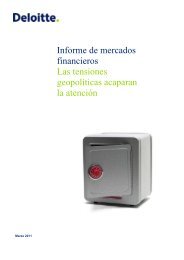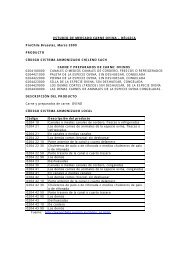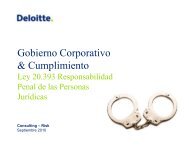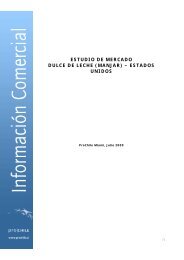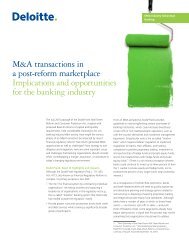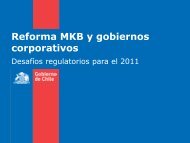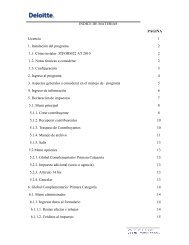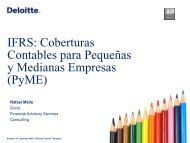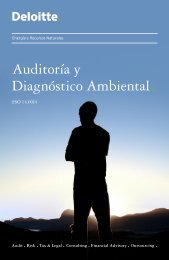Tax Advisers - Deloitte
Tax Advisers - Deloitte
Tax Advisers - Deloitte
Create successful ePaper yourself
Turn your PDF publications into a flip-book with our unique Google optimized e-Paper software.
United States<br />
A year in US international tax<br />
Dan Lange<br />
<strong>Deloitte</strong><br />
Milwaukee<br />
The year 2006 saw the passage of the <strong>Tax</strong> Increase<br />
Prevention and Reconciliation Act (TIPRA) and the<br />
introduction of a slew of major tax regulatory changes and<br />
accounting for income tax changes. The changes introduced<br />
and proposed reflect a trend towards heightened regulatory<br />
scrutiny, pressure for transparency and accuracy in financial<br />
reporting, and more demanding compliance burdens, the<br />
combination of which creates tremendous new pressures for<br />
tax and finance departments.<br />
The news isn’t all bad, however. TIPRA provides for a threeyear<br />
exclusion from Subpart F income for related party<br />
dividends, interest, rents and royalties, provided the<br />
underlying earnings of the parties are not Subpart F income.<br />
The temporary exception will afford multinationals more<br />
freedom to move cash among their controlled foreign corporations (CFCs) without<br />
creating Subpart F income. However, Congress subsequently passed legislation<br />
(awaiting the President’s signature) to add the requirement that payments also not be<br />
attributable or properly allocable to the payor’s US effectively connected income.<br />
The bulk of the year’s most significant developments, however, are at the regulatory<br />
level.<br />
FIN 48<br />
The Financial Accounting Standards Board (FASB) issued new rules (known as FIN<br />
48) that radically change how companies account for uncertain income tax positions in<br />
their financial statements. FIN 48, effective for tax years beginning after December 15<br />
2006, changes the threshold that tax benefits must meet before they can be recognized<br />
in a company’s financial statements. FIN 48 will substantially increase the disclosure/<br />
documentation burden on companies. The impact of FIN 48 in the international<br />
context, where uncertainty is often the norm, will be considerable and will result in<br />
multinationals changing the amount of their reserves for tax liabilities.<br />
Calculation of branch income<br />
The IRS issued highly anticipated proposed regulations governing the translation of<br />
income of foreign branches, disregarded entities and partnerships, and the calculation of<br />
gains/losses upon remittances from such entities where they carry out business in a<br />
currency other than the taxpayer’s functional currency. The regulations completely alter<br />
the prescribed approach of rules proposed in 1991, adopting a foreign exchange exposure<br />
pool method for computing exchange gains and losses on remittances, a method that will<br />
result in more complexity and an increased compliance burden. The proposed<br />
regulations, however, generally provide favourable transition rules.<br />
Interest deduction of foreign banks<br />
Temporary regulations were issued dealing with the determination of deductible<br />
interest expense of a US branch of a foreign bank. The regulations liberalize the<br />
election in the branch profits tax rules to reduce US liabilities, so that the election can<br />
be used to entirely eliminate branch profits tax liability in many instances.<br />
Services regulations<br />
Final and temporary regulations were issued relating to the treatment of inter-company<br />
service transactions and the allocation of income from intangibles, as well as rules<br />
relating to stewardship expenses. The regulations replace 1968-era guidance, and<br />
include many changes to 2003 proposed regulations. A particularly negative effect is the<br />
restricted definition of stewardship costs, potentially increasing the expenses that will<br />
have to be charged out. Although the intent of the rules is to reduce the documentation<br />
requirement burden on taxpayers, they likely will have the opposite effect.<br />
245




